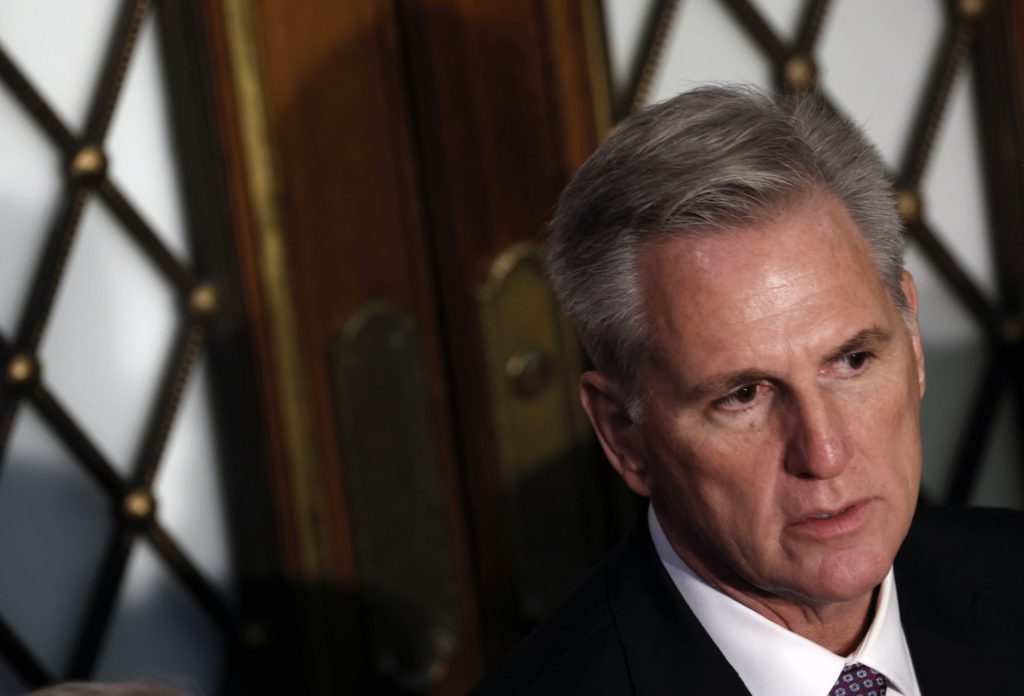(Bloomberg) — House Republican leaders are doing an unusual amount of wrangling to get the votes for a must-pass rules package, a preview of what’s to come in a chamber where both flanks of the GOP have lingering frustrations with Speaker Kevin McCarthy.
(Bloomberg) — House Republican leaders are doing an unusual amount of wrangling to get the votes for a must-pass rules package, a preview of what’s to come in a chamber where both flanks of the GOP have lingering frustrations with Speaker Kevin McCarthy.
McCarthy’s speakership was won only by a series of concessions to hard-line conservatives — some enshrined in the formal proposed rules, others merely sealed with a handshake — that give the party’s right flank out-sized influence in the chamber.
The less formal promises, including a vote on lawmaker term limits and allowing three populist conservatives seats on the powerful Rules Committee, have caused some of the most consternation. But the frustrations threaten to spill over onto Monday’s vote on the rules, potentially sinking McCarthy’s first test of leadership and further delaying the House’s ability to actually get to work.
Here’s a look at some of the key provisions in the House rules package itself:
Ejecting the Speaker: It would only take one House member to trigger a no-confidence vote on the speaker. That’s a major change from the last Congress, when such a move required a majority of either party.
The low bar is risky for McCarthy — and one doesn’t have to go back far for an example. House Speaker John Boehner resigned after then-GOP Representative Mark Meadows filed a motion to vacate the chair against him in July 2015.
Demise of the Jan. 6 committee: The package would make clear that the panel that probed the Jan. 6, 2021 insurgency at the Capitol — and that blasted former President Donald Trump for inciting the attack — is terminated and transfer its materials to the House Administration Committee by Jan. 17. The National Archives also would have to cough up its own records related to the Jan. 6 panel probe.
New coronavirus panel: A select subcommittee on the coronavirus pandemic would be created to study the origins of the pandemic and the effectiveness of the government response to the outbreak. The committee wouldn’t move legislation but it would issue its final report by Jan. 2, 2025 and then disband.
Office of Congressional Ethics: The package would create term limits for the OCE, an independent, non-partisan board that reviews allegations of misconduct by House lawmakers and makes recommendations to the House Ethics Committee. Board members would be limited to eight years, a move critics say would force out three of the four members appointed by Democrats.
CUTGO: The rules package would create a new “cut-as-you-go” rule to require mandatory spending programs like Medicare to be offset or not add to the federal deficit. It would replace the “pay-as-you-go” or PAYGO rule that had applied to both mandatory spending and changes to federal revenue.
This change would also make it easier to enact deficit-increasing tax cuts. There are exceptions for “emergencies,” and the House has the ability to waive the rule.
Supermajority for tax hikes: Any piece of legislation that would boost taxes would require a three-fifths supermajority to clear the House.
Targeting federal employees’ paychecks: The package would restore a past GOP provision that allowed lawmakers to use spending bills to zero out salaries of specific executive branch officials. This could be used to pressure officials to alter executive actions or change investigations.
Debt limit: The rules package would require the House to directly vote on any proposal to raise or suspend the debt limit, which probably will be needed in this year’s third quarter to prevent a default. It would repeal a rule that enabled the House to automatically approve a debt-limit increase after the House simply passes an outline of the annual budget.
Ending pandemic-spurred remote voting and hearings: Proxy voting on the House floor would be eliminated and committees would be barred from conducting business remotely. One caveat: witnesses who don’t work for the government could testify remotely if a chairman agrees to it.
–With assistance from Billy House.
More stories like this are available on bloomberg.com
©2023 Bloomberg L.P.










